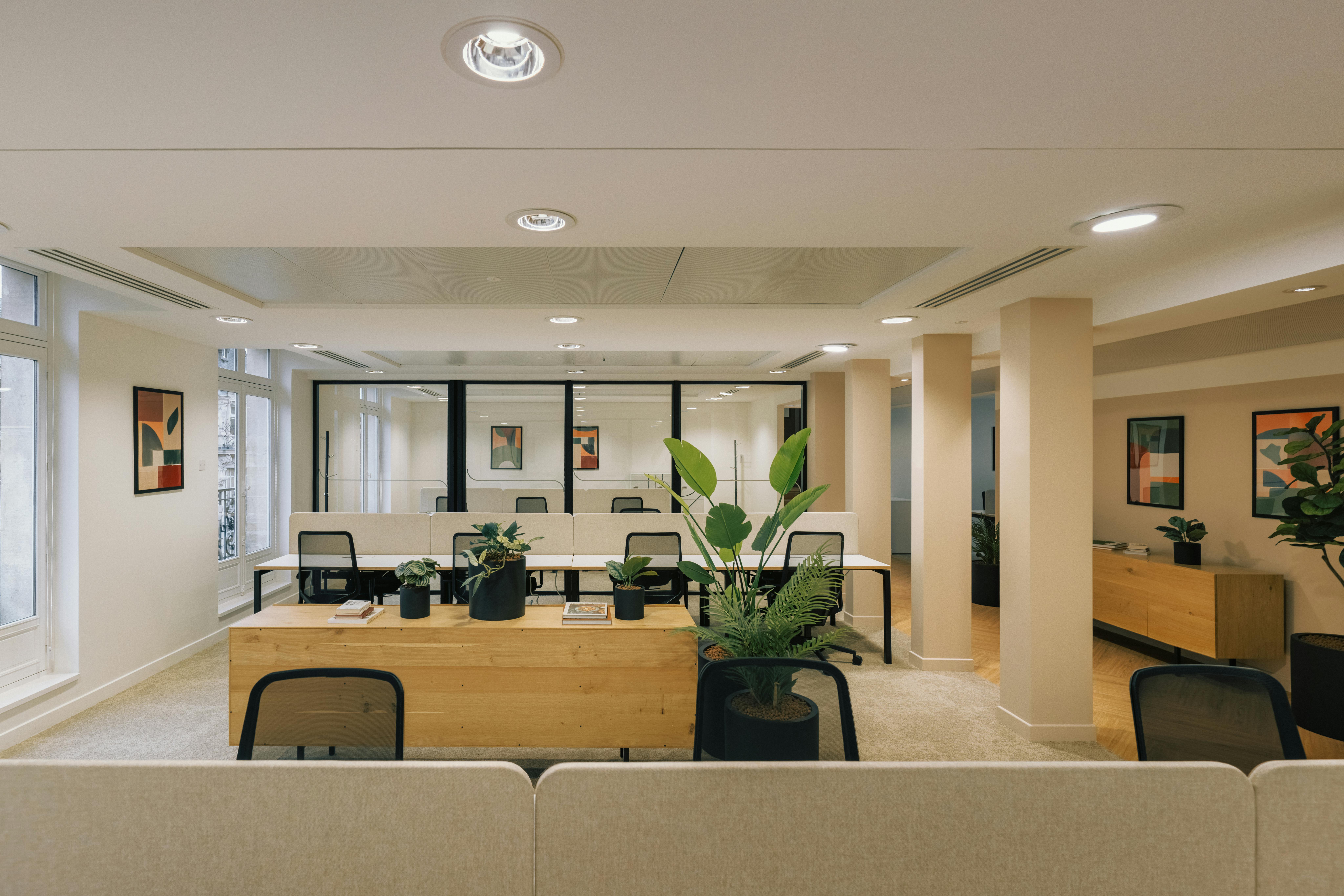

What is corporate culture?
Corporate culture is a concept that refers to the set of values, beliefs, norms, and behaviors shared by members of an organization. It defines the unique identity of the company and influences how employees interact, work together, and thrive in their professional environment.
As such, it plays a crucial role in attracting and retaining talent, employee satisfaction, and overall company performance. Understanding its various facets is essential to creating a positive employee experience and ensuring the long-term success of the company.
Do you want to establish a strong corporate culture within your company? Unsure about the strategy to adopt? Don’t worry, Deskeo explains everything you need to know to fully understand the notion of corporate culture.
Understanding corporate culture
To grasp the concept of corporate culture, it is important to know its definition and explore its different components.
Definition and its various components
Corporate culture encompasses all aspects that define the identity and unique character of an organization. It includes:
- The company's vision and mission.
- Core values.
- Behavior norms and expectations for employees.
- Management and leadership practices.
- Company rituals and traditions.
- Work environment and space layout.
All these components influence how employees interact and work together.
Vision, values, and corporate culture
La vision et les valeurs de l'entreprise sont au cœur de sa culture. La vision définit les objectifs à long terme et la direction stratégique de l'organisation, tandis que les valeurs représentent les principes fondamentaux qui guident les actions et les décisions de l'entreprise et de ses employés.
Une culture d'entreprise forte et cohérente repose sur l'alignement entre la vision, les valeurs et les pratiques quotidiennes.
Lorsque ces éléments sont en harmonie, les employés comprennent alors clairement ce que l'on attend d'eux et sont plus enclins à s'engager dans leur travail et à contribuer à la réussite de l'entreprise.
Different types of corporate cultures
There are several types of corporate cultures, each with its own characteristics and impacts on the organization. Among the most common are:
- Clan culture, which values collaboration, cohesion, and loyalty.
- Hierarchical culture, which emphasizes structure, procedures, and stability.
- Entrepreneurial culture, which encourages risk-taking, innovation, and autonomy.
- Market culture, which prioritizes competitiveness, performance, and goal achievement.
Each company develops its own culture based on its values, history, and industry. It is essential to understand the type of culture prevailing in an organization to grasp its functioning and internal dynamics.
The importance of corporate culture
Corporate culture plays a vital role in the success and sustainability of an organization. It influences not only the well-being and engagement of employees but also the overall performance of the company.
Benefits of a strong corporate culture
A solid corporate culture offers numerous advantages for organizations as it helps to:
- Improve employee satisfaction and engagement.
- Strengthen talent retention and reduce turnover.
- Foster collaboration and team projects.
- Stimulate creativity.
- Attract top talents in the market.
- Enhance the company's reputation and brand image.
By cultivating a positive and engaging corporate culture, organizations create an environment where employees feel valued, inspired, and motivated to give their best. More importantly, it encourages them to stay with the company.
Employee retention and performance improvement
A strong corporate culture has a direct impact on employee retention and organizational performance. When employees align with the company's values and culture, they are more likely to stay long-term and fully invest in their work. This talent retention translates to reduced costs associated with recruitment and training, as well as improved productivity and work quality. Companies with a solid culture thus gain a significant competitive advantage in their market.
Many renowned companies have understood this and established unique and inspiring corporate cultures.
Three companies with a strong corporate culture
Among the most frequently cited companies for their corporate culture are big names such as:
- Google, which values innovation, creativity, and employee well-being.
- Apple, which emphasizes excellence, design, and "out of the box" thinking.
- Netflix, which promotes transparency, autonomy, and employee empowerment.
These companies have succeeded in creating strong cultures that reflect their values and contribute to their long-term success. However, establishing a sustainable culture requires long-term efforts as employees' expectations of their professional environment evolve over time, and companies must adapt to these new expectations to continue attracting and retaining talent.
Modern employee expectations
Employees in today's job market have different expectations from those of previous generations. To meet these new expectations, companies must evolve their culture and practices.
New employee expectations
After long allowing their professional lives to encroach on their private lives, employees now seek a professional environment that offers:
- A satisfying work-life balance.
- Opportunities for development and continuous training.
- A flexible and adaptable work environment.
- An inclusive and diverse corporate culture.
- Compassionate and attentive management.
- Meaningful work aligned with their personal values.
To meet these expectations, companies must rethink their approach to human resource management and evolve their culture accordingly.
Impact on recruitment and talent retention
In an increasingly competitive job market, companies that successfully meet employee expectations gain a significant advantage in terms of recruitment and talent retention. An attractive corporate culture aligned with employees' aspirations is key to standing out from the competition and attracting top talent. Candidates are increasingly attentive to the culture and values of the companies they consider joining and do not hesitate to favor those offering a fulfilling work environment aligned with their own values. Additionally, employees who resonate with the company's culture are more likely to invest long-term and contribute to its success.
Construction et renforcement de la culture d'entreprise
Construire et maintenir une culture d'entreprise forte nécessite un effort concerté et continu de la part de l'organisation. C’est pourquoi il est essentiel de mettre en place des stratégies et des pratiques qui permettent de façonner et de renforcer cette culture au fil du temps.
Building and strengthening corporate culture
To build a strong corporate culture, organizations should:
- Clearly define their vision, mission, and values: These foundational elements must be communicated and shared with all employees.
- Involve employees in the culture-building process: Invite them to participate in discussions and team workshops on the company's values and practices.
- Align management practices with the desired culture: Managers should embody the company's values and adopt behaviors consistent with the targeted culture.
- Regularly communicate about the corporate culture: Use various communication channels (meetings, newsletters, intranet, etc.) to reinforce key messages and maintain employee engagement.
- Celebrate successes and achievements that reflect the culture: Highlight employees and teams that embody the company's values.
Strategies to strengthen an existing corporate culture
Once established, it is important to continue nurturing and reinforcing the corporate culture over time. Organizations can:
- Encourage employee feedback and suggestions: Implement open communication channels and consider employee feedback.
- Evolve company practices based on needs: Adapt processes and work modes to meet employee expectations and maintain alignment with the culture.
- Integrate culture into recruitment and onboarding processes: Evaluate candidates' fit with the company's culture and guide new hires in understanding and adhering to this culture.
- Offer training and workshops on corporate culture to reinforce employee understanding and engagement with the organization's values and practices.
By implementing these strategies, companies ensure a strong and coherent culture over time while adapting to changes in the workforce and employee expectations.
Offices and corporate culture
Beyond managerial practices and HR strategies, the physical work environment also plays a key role in developing and maintaining corporate culture. Office spaces should be designed to reflect and reinforce the organization's values and culture.
Role of workspaces in corporate culture
Workspaces have a direct impact on employee well-being, motivation, and productivity. By creating environments aligned with their culture, companies can:
- Promote collaboration and team exchanges.
- Encourage creativity and innovation.
- Strengthen employees' sense of belonging and engagement.
- Attract and retain talent by offering an attractive and stimulating work environment.
Office layouts, furniture choices, and relaxation and social spaces all contribute to shaping corporate culture and creating a positive employee experience.
However, designing offices that align with your corporate culture is not always easy, and many companies struggle to know where to start. Is this your case? Don’t worry, Deskeo is here to help!
Examples of successful layouts by Deskeo
Deskeo, a specialist in office leasing, offers workspaces designed to meet companies' needs and strengthen their culture.
We have notably designed the offices for:
- Doctrine, for which we created modular spaces that combine hyper-growth and well-being at work. These spaces are bright and spacious, true to the company's DNA, where employees can work, eat, and even rest.
- Sorare, which wanted a unique and atypical workspace that reflects its culture and accommodates all its employees in the best conditions. At their request, we created a 1,800m² space where employees can feel "at home" and where they can relax, work, and even play football.
- Decathlon Technology, for which we designed extensible offices decorated in homage to sports, perfect for flexible workspaces and hosting numerous meetings.
By offering flexible workspaces adapted to each company's culture, Deskeo helps create professional environments that are fulfilling and conducive to success.
Impact of offices on collaboration and productivity
Well-designed offices that align with corporate culture have a positive impact on team collaboration and productivity. By offering spaces adapted to different work modes (concentration, collaboration, creativity), companies enable employees to:
- Communicate better and share ideas.
- Work more efficiently and productively.
- Develop creativity and innovation.
- Strengthen team bonds and cohesion.
Quality workspaces aligned with a company's culture create optimal conditions for employees to thrive and give their best.
In summary, corporate culture is a key element in the success and sustainability of organizations. By understanding the various facets of corporate culture, meeting modern employee expectations, and creating adapted work environments, companies can build a strong, attractive culture conducive to long-term success.


Contact Us
We find your Perfect fit!

